This article was updated on May 15, 2025.
TRURO — Beneath the spring sunshine and the vaguely Cirque du Soleil white tent under which Truro now holds its town meetings, a peaceful but unmistakable showdown unfolded on May 3.

The speakers on one side included many millennials — working people and business owners, many raised in town, some with parents and children in tow. The speakers on the other side were long-term residents as well, veterans of the town’s civic process, who frequently spoke on housing-related measures to say the cart and horse were disarranged.
No one claimed to oppose affordable housing — instead, resistance came dressed in the language of water protection, procedural concern, and the need for more study. The two marquee housing votes of the night, one accepting the state’s new “seasonal communities” designation and another to create a zoning overlay district for the town-owned Walsh property, were both close. Both passed.
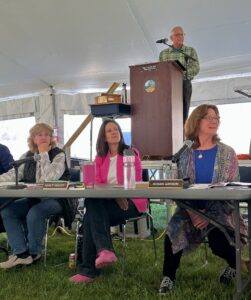
There were 423 voters — more than turned out in Provincetown or Wellfleet last month — and Town Moderator Paul Wisotzky opened the six-hour session with a stirring nod to colonial times, reminding attendees that town meeting was once a revolutionary act derided by British governors.
“I’m not suggesting with today’s history lesson that we need to be troublemakers and rabble rousers,” said Wisotzky, but rather “for us to embrace the freedom to raise our voices, the freedom to express differing viewpoints, and the privilege and opportunity to work together respectfully, kindly, and honestly to shape our collective future.

“Upholding this democratic practice is more important than ever now,” Wisotzky added.
Free Cash and Taxes
The town’s $27.7-million operating budget was approved with no discord, but Article 3 — a 16-part buffet of free cash spending — devoured the morning. It included funding for zoning bylaw consultant Kennan Rhyne ($45,000), a climate action coordinator position held by Chris Palmer ($40,000), and a test run for electronic voting next year ($20,000), all of which voters approved.
After a 90-minute dissection of the town’s free cash habits, voters briskly greenlit a $3.2-million borrowing and debt exclusion to clean up PFAS contamination at Town Hall Hill.
They also backed $200,000 for design work on stormwater improvements along Pond Road and $250,000 for HVAC and roof repairs at Truro Central School.
Debt exclusions add to the amount of property tax the town can levy, while free cash is the money remaining on hand after last year’s budget has been closed out. Because they directly raise taxes, debt exclusions are hotly contested in many towns — but in Truro this year, free cash took all the heat.
There was one more debt exclusion measure: Article 13, which authorized $5 million in borrowing to install solar arrays on town property. The proposal had been brought forward by the energy committee, and “it would produce enough clean electricity to power all municipal buildings three times over — or about 150 Truro households,” Palmer said.
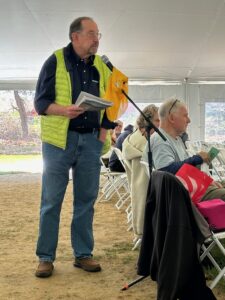
Energy committee co-chair Brian Boyle said solar power could bring in $550,000 a year with $90,000 in annual maintenance costs. It passed overwhelmingly.
Seasonal Communities
Article 27 asked voters to accept the “seasonal communities” designation created by the state’s new Affordable Homes Act — a provision authored by Cape and Islands state Sen. Julian Cyr, a Truro native.
The designation gives towns with a high percentage of seasonal or vacation homes — Truro is at 67 percent, according to the Cape Cod Commission — tools to promote year-round housing.
Housing authority chair Betty Gallo called it “a pathway to addressing much-needed attainable housing” that could be targeted at the “missing middle” who make too much to qualify for affordable rental apartments. “This includes medical employees, teachers, fire and rescue workers, and others who serve vital roles in Truro,” Gallo said.
Housing authority vice chair Mara Glatzel said that she had lobbied for the designation at the state level alongside others “working really hard to creatively meet housing needs on the Cape.”
Opponents including Dennis O’Brien, Clinton Kershaw, Laurie Lee, and Michael Forgione didn’t buy it. They said the town lacked adequate information to move ahead with a vote.
A teller count was slowly tallied — but when the section-by-section results were announced, microphones weren’t working and tellers spoke over each other. To eliminate any doubt the entire count was done again. When that one was announced, Tim Hickey challenged it.
Wisotzky declined to order a third count, and the measure passed, 196 to 132.
Walsh Overlay
Article 32 was the main event: a zoning overlay district for the 70-acre Walsh property to set the stage for a mix of multi-family housing, retail use, and dedicated open space. Whether the proposal supplanted or supported last year’s Walsh Committee recommendations was a disagreement the two camps could not bridge.
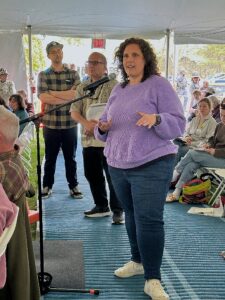
“It has nothing to do with water, sewage, traffic, infrastructure, or building design,” said zoning task force vice chair Darrell Shedd. “If you are for affordable housing in the least little bit, you cannot be against an article that simply makes it possible.”
Supporters lined up at the microphones: Glatzel, Ellery Althaus, Kenneth Oxtoby, Jeff Fischer, Anne Greenbaum, Jackie Fein-Zachary, Kolby Blehm, and Nancy Medoff.
Greenbaum, vice chair of the planning board, tried to assuage fears about water before they had even been raised. Protecting groundwater “is the given we start with,” but planning for other uses can happen in tandem, she said. “Let’s do water. Let’s do housing. We’re one town — let’s do them together.”
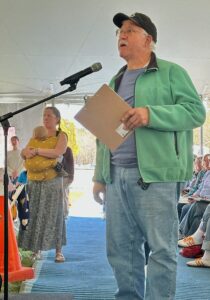
Opponents were not convinced. Forgione warned of a 660-unit “Walsh City” and cast doubt on the term “attainable housing.” “This is funding the rich,” he said.
Planning board clerk Jack Riemer said the overlay “fails to consider water protection,” and planning board chair Rich Roberts said it was “ahead of the hydrology and ahead of the science.”
“Water should be at the top of the planning process,” said Karen Ruymann, advocating against the measure. “Vote like your children’s futures depend on it.”
It took only one teller-counted vote this time: the overlay passed 154 to 127.
Citizens’ Petitions
Clint Kershaw had placed two petitioned articles on the warrant — one that aimed to use free cash to lower taxes and another to allow the town to plow private roads — but neither was in a legal format to become operative and both were indefinitely postponed.
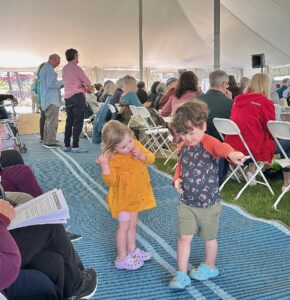
Dennis O’Brien’s first petition was to ban finance committee members from holding committee seats appointed by the select board — something other towns do to maintain the committee’s complete independence, he said.
Select board member Stephanie Rein said that “in a town as small as Truro” it can be hard to fill committee seats, and former Town Moderator Monica Kraft said that she had “never seen any kind of conflict, ever” in the years that she appointed finance committee members. The charter amendment failed.
O’Brien’s second petition — and the last article of what was now the late afternoon — was a nonbinding resolution capping the cost of a new DPW facility at $20 million and calling for two competing designs. It lost, too, albeit in the closest vote of the meeting.
“Cost needs to be the driving force behind this project, not design,” O’Brien said. “Let’s send the message that we will not support the inflated project.”
The very next speaker, Kenneth Oxtoby, called the question.
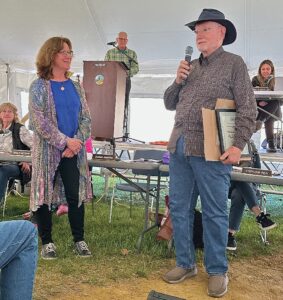
After a section-by-section teller count, the results were announced: 100 voters in support of O’Brien’s petition and 117 against.
“With that, we are done,” said Wisotzky, and the crowd clapped and cheered, spirits largely intact.
Editor’s note: A sentence in an earlier version of this article, published in print on May 8, may have mischaracterized the speakers on one side of the discussion of housing by saying they were “largely” millennials. Millennials were conspicuously present but may not have made up the majority of the speakers in favor of more housing.



